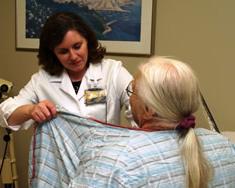 It comes as no surprise that poor women are more likely to die from breast cancer given their limited access to cancer screening and treatment. What comes as a surprise is that this is a reversal of a previous trend, in which women with adequate to substantial financial resources had been at greater risk of dying from the disease.
It comes as no surprise that poor women are more likely to die from breast cancer given their limited access to cancer screening and treatment. What comes as a surprise is that this is a reversal of a previous trend, in which women with adequate to substantial financial resources had been at greater risk of dying from the disease.
“In general, progress in reducing breast cancer death rates is being seen across races/ethnicities, socioeconomic status and across the U.S.,” said Dr. Otis Brawley, chief medical officer for the American Cancer Society, in a society news release. “However, not all women have benefited equally.”
“Poor women,” he noted, “are now at greater risk for breast cancer death because of less access to screening and better treatments. This continued disparity is impeding real progress against breast cancer, and will require renewed efforts to ensure that all women have access to high-quality prevention, detection and treatment services.”
A new report, “Breast Cancer Statistics, 2011″ is in the current issue of CA: A Cancer Journal for Clinicians states that the overall U.S. breast cancer death rate has been on a steady decline for more than two decades. For women under 50, fatalities fell roughly 3 percent per year since 1990. For patients over 50, the drop was about 2 percent per year.
However, the new report states that death rates have not fallen at the same pace across all racial and socioeconomic lines.
Dr. Rachel A. Freedman, a Boston-based medical oncologist with the Dana Farber Cancer Institute, said that less-affluent breast cancer patients face a “perfect storm” when it comes to mortality risk. She states, “Women from lower economic status have less access to resources, have suboptimal insurance coverage, may receive substandard care and often present with more advanced cancer at diagnosis. So it’s not surprising that they often face a substandard outcome.”
Dr. Freedman went on to say, “It’s a really complicated situation and that means that complicated interventions will be required to tackle this problem. But unfortunately, I don’t see anything happening right now that’s going to turn this around in the near term.”
Sources: American Cancer Society, Rachel A. Freedman, M.D., medical oncologist, Dana Farber Cancer Institute, Boston, Mass.; CA: A Cancer Journal for Clinicians, Sept. 22, 2011, news release
 It comes as no surprise that poor women are more likely to die from breast cancer given their limited access to cancer screening and treatment. What comes as a surprise is that this is a reversal of a previous trend, in which women with adequate to substantial financial resources had been at greater risk of dying from the disease.
It comes as no surprise that poor women are more likely to die from breast cancer given their limited access to cancer screening and treatment. What comes as a surprise is that this is a reversal of a previous trend, in which women with adequate to substantial financial resources had been at greater risk of dying from the disease. 
